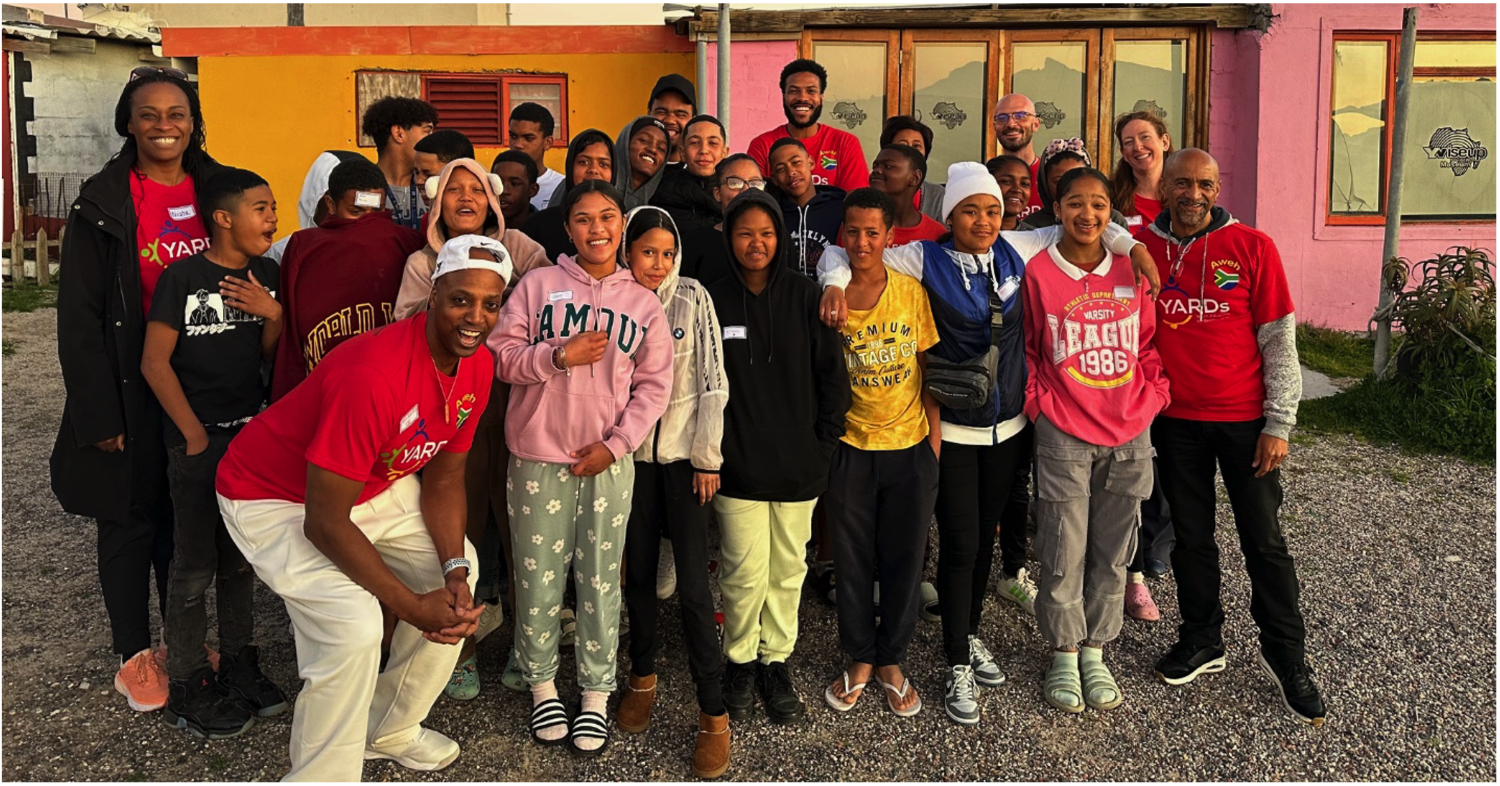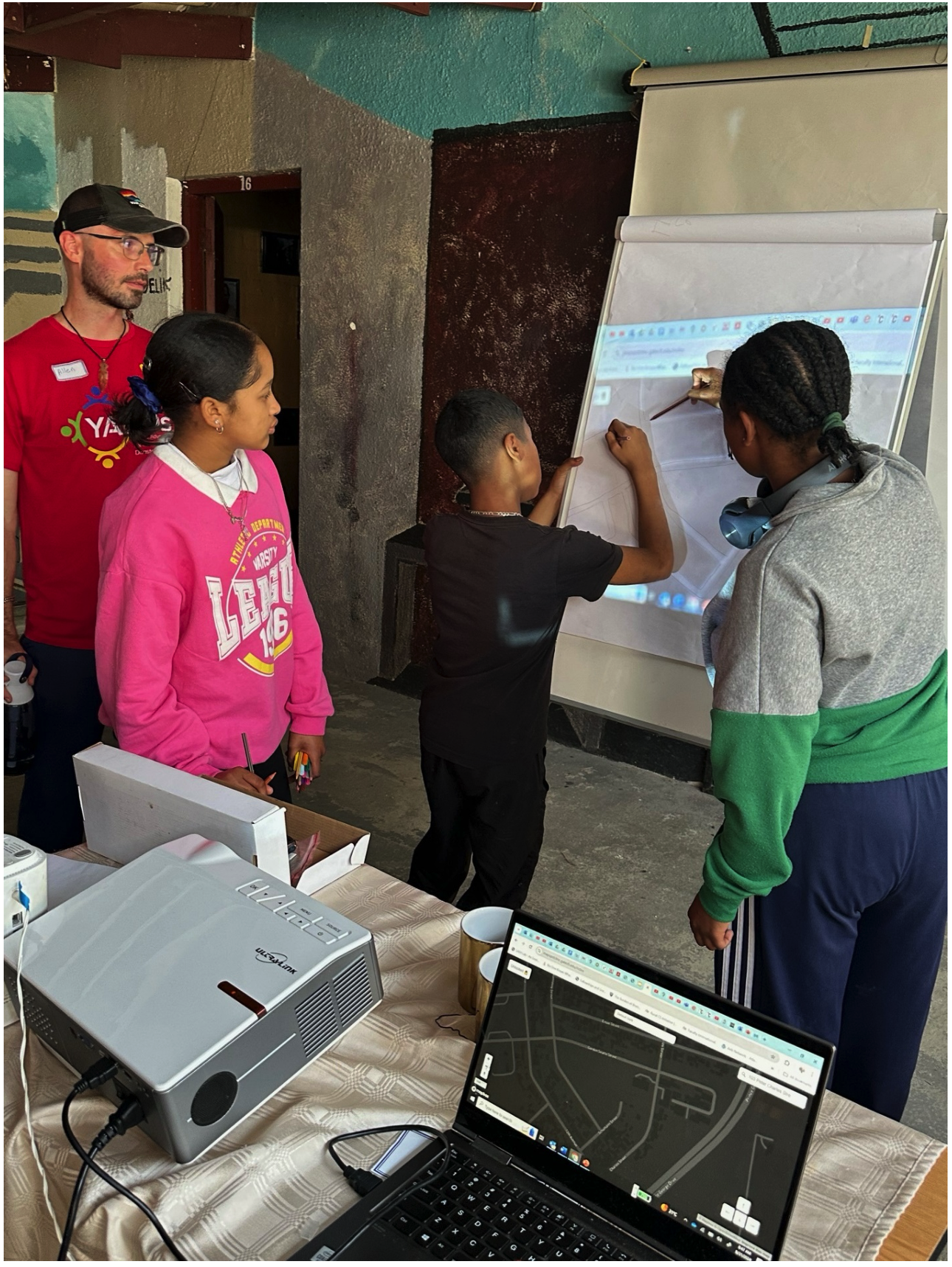Youth Advocacy for Resilience to Disasters: A Transformative Program in Cape Town, South Africa
Sep 27, 2024 — Atlanta

The YARDs project team at Cape Flats YMCA in Cape Town, South Africa
Recently, a team from Georgia Tech and the University of Minnesota conducted a youth disaster resilience program at the Cape Flats YMCA in Cape Town, South Africa. This initiative, known as Youth Advocacy for Resilience to Disasters (YARDs), aims to educate young people about environmental justice, civic engagement, and community resilience.
Originally funded by the National Science Foundation’s Civic Innovation Challenge grant, this particular trip was supported by internal funds from both universities. The program's core objective is to help youth understand and address disasters and climate resilience through the lens of environmental justice.
Participants learn about their community's assets and vulnerabilities, engage in virtual mapmaking, and develop green and gray infrastructure solutions to present to local leaders.
Research support from the University of Minnesota was provided by Nisha Botchwey, dean of the Hubert H. Humphrey School of Public Affairs. She was a co-principal investigator in the original NSF grant and previously worked at Georgia Tech. Katie O’Connell, research scientist at the University of Minnesota, also participated in the project and teaches at both universities.
Allen Hyde, associate professor in the School of History and Sociology in Georgia Tech’s Ivan Allen College of Liberal Arts, is the principal investigator for the YARDs project. He is also a research initiative lead for responsible and ethical technologies with Georgia Tech’s Institute for People and Technology.
“When we were invited to participate in the Sixth World Congress for Social and Racial Inequality in Cape Town, we wanted to leverage some existing connections with the project team and youth organizations in South Africa,” said Hyde. “While the goal was to provide educational opportunities for the youth in Cape Flats, the trip was a deep education on the social and historical conditions of Cape Town and South Africa, and lived experiences of Cape Flats youth for the research team.”
Cape Town was chosen for its unique challenges and existing personal connections among some research team members. Mustafa Shabazz, the YARDs project manager and lecturer for Georgia Tech Professional Education, leveraged his ties with the Cape Flats YMCA to facilitate the program. Ricardo De Reuck, director at the Cape Flats YMCA, welcomed the team’s project to engage the children. The team was also invited to present at the Sixth World Conference on Remedies to Racial and Social Inequality at the University of the Western Cape, further solidifying the team’s decision to conduct a program in South Africa.
Cape Town's coastal location and climate makes it susceptible to both flooding and wildfires, particularly in densely populated areas like Cape Flats. However, upon engaging with the local youth, the team discovered that natural disasters were not their primary concern. Instead, issues like gang activity and crime dominated their daily lives. This insight led to a shift in focus, allowing the youth to develop action plans addressing social issues alongside natural disasters.
The program, condensed into two days, involved 25 youth aged 12 to 16. Despite logistical challenges, such as limited electrical outlets and Wi-Fi connectivity, the participants actively engaged in drawing meaningful maps and creating action plans. The experience highlighted the importance of flexibility, understanding the community's needs, and pivoting when conducting a YARDs program.
The team also explored potential collaborations with the YDentity Museum with the Cape Flats YMCA, which delves into the social and ethnic history of the area. This museum could play a significant role in future projects, amplifying the program's impact.
Overall, the YARDs program in Cape Town was a learning experience for both the participants and the organizers. It underscored the necessity of adapting to the community's needs and the potential for continued collaboration with the Cape Flats YMCA.
“While Savannah, Georgia and Cape Town, South Africa have many differences in their social and economic contexts, both the youth participants and the research team saw many overlaps,” said Hyde. “Our communities in both countries are often unequal. Not only in terms of infrastructure, access to jobs, and educational opportunities, but also access to parks, green space, safety and exposure to violence, and youth programs.”
“YARDs helps youth imagine more resilient and thriving communities, whether that be due to exposure to acute climate disasters like hurricanes and flooding or simmering social disasters like a lack of economic and social opportunity and exposure to violence and gangs that becomes normalized due to everyday exposure. Youth are our future. We must ensure that their voices are heard as we plan, imagine, and design our communities. If ignored, then future generations will likely pay the price.”

Cape Flats YMCA students working on projected maps with Allen Hyde.




